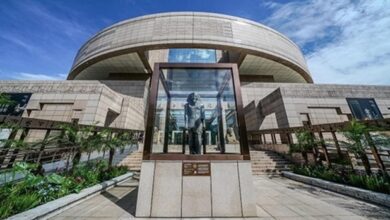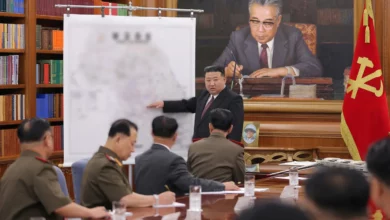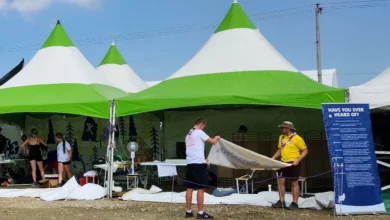Hundreds of eager Korean pop culture fans and curious visitors crammed into Maadi Library’s stage theater Thursday afternoon to witness the final round of the K-POP Korean Song Festival, organized by the Korean Embassy in Cairo.
The idea of the festival was to create a "pop idol-esque" atmosphere aimed at encouraging cultural relations between Egypt and South Korea by allowing the growing number of steadfast Korean culture fans throughout Egypt to compete on stage by reciting their favorite Korean pop songs.
“Egyptian and Korean cultures really have so much in common,” says Yoon Jong-Kon, the Korean ambassador in Cairo. “Korea places the same emphasis on family, friends and tradition as Egypt does and I hope by targeting the young generation, Korea and Egypt will continue to build stronger ties.”
After a preliminary competition held on Monday, 30 contestants were selected for the finals. In the end, audience members and a judging panel would ultimately select one winner. The only requirement to compete was to be of Egyptian nationality, though all nationalities were welcome to be in the audience.
The result was a huge success, but also epically bizarre.
Stepping off of a hot New Maadi street and straight into an adjacent theater where hundreds of Egyptian teenagers and 20-somethings were conversing in Korean, dressed in Korean pop culture merchandise, intently rehearsing their acts, and eventually, screaming along to many of the Korean songs, was beautifully disorienting.
It took this reporter most of the first hour to digest the novelty of the situation.
Banners written in Korean by Egyptians were waved about, accompanied by Korean chants of encouragement.
The lights would dim for a slow Korean ballad by a solo contestant, which would be sung perfectly with somber, focused passion to the cue of gentle claps and tilted, engaged expressions from the audience.
This would be followed by a five-piece performance with the audience jumping out of their seats; the group would share individual vocal lines with backing harmonies in the verse, followed by an explosive chorus where the whole audience would join in a deafening craze.
All of a sudden, it felt as if one were almost an outsider to not know the lyrics to at least one Korean pop song; as if hundreds of patient Korean pop culture fans had, after many long years, finally been given the opportunity to come out of their shells, and much to the support of the madly enthusiastic audience.
“Korean culture is just so advanced when it comes to the arts,” says Alex Hammad, 21, a contestant and student from the Academy of Arts in Haram.
“My friends used to laugh at me when I said I loved Korean culture, but the message I want to get across is: Give Korean culture a chance and always explore new things. What you’re looking for might be where you least expect it,” she adds.
The crowd was also scattered with many Korean nationals living in Egypt who heard about the event, either through the embassy or word of mouth, and decided to attend – often to equally as much warmth as revelation.
“Being Korean in Egypt is often quite alienating for reasons that I can’t really put my finger on,” says Daniel Chung, a Korean Maadi resident.
“Coming here and seeing hundreds of Egyptians being curious by my looks and where I come from is just really touching – I almost feel as if we are no different. I feel like I’m at home.”
During intermissions and after events, various Korean foods – bulgogi, japchae, topokki and kimchi -were put out with free take-home recipe books for attendees to experiment and learn about.
After a couple of hours, Koreans, Egyptians and various other nationalities were laughing together and engaging in dialogue concerning favorite bands to favorite movie stars.
“[Korea & Egypt] don't just want Western-stylized societies,” adds Ambassador Jong-Kon. “We want stable ones – and the only way this can be executed is if we continue learning from each other.”
Park Jae Yang, the Korean Embassy’s counselor for culture and information, also stressed that this is a particularly important time for Egypt because times are changing, and the youth of the revolution will hopefully mature with cultural awareness ingrained in them.
At the end of the emotional day, after dozens of performances, American University in Cairo student Eman Badr emerged as the contest's winner after performing the Korean ballad "It Hurts" (apa in Korean) – a song about the pains of girl whose boyfriend had just left and was now treating his new girlfriend exactly as he used to treat her.
The audience folded under her passionate intensity.
Badr, 19, is self-taught in Korean reading, writing and speaking, and dreams of one day living in South Korea. Asked about winning the competition, she told Al-Masry Al-Youm:
“I’m completely speechless. I love Korea beyond words. I no longer feel as isolated as I used to. It really has been the greatest opportunity I’ve ever had, as far as I can remember.”




